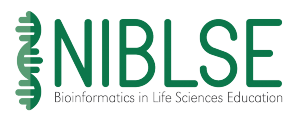Resources
Bioinformatics: Investigating Sequence Similarity - A Plant Biology Approach
Author(s): Ami Erickson
2267 total view(s), 1585 download(s)
Bioinformatics Wkst_Plant Biology.docx(DOCX | 412 KB)
Erickson_NIBLSEFMNTeachingNotes.docx(DOCX | 19 KB)
Exercise 2. Protein Alignment Hand Out.docx(DOCX | 32 KB)
- Sequence Similarity: An inquiry based and "under the hood" approach for incorporating molecular sequence alignment in introductory undergraduate biology courses | CourseSource
- License terms
Description
This exercise was conducted in a sophomore level Plant and Fungal Biology course. I utilized most of exercise 1 and 2 from Adam Klenschmit’s publication. To tailor the lab for a plant biology course I replaced the comparison in exercise 2 between the chimpanzee and human with two comparisons: one between Arabidopsis and a moss species; the other between Arabidopsis and yeast. I also removed the “One Fish, Two Fish” example to shorten the exercise.
The goal for this activity was to demonstrate how bioinformatics is used to evaluate evolutionary relationships between plants.The week prior to completing this activity, students conducted a morphological comparison between bryophytes, vascular – seedless plants, angiosperms and gymnosperms. They had also read associated textbook chapters and discussed a paper about the evolution of land plants (de Vries and Archibald, 2018).
The activity was completed during a 3 hour lab session in a computer lab, and the activity was a little long for the time allotted.
CourseSource Citation of original publication
Kleinschmit, A., Brink, B., Roof, S., Goller, C., and Robertson, S.D. 2019. Sequence Similarity: An inquiry based and “under the hood” approach for incorporating molecular sequence alignment in introductory undergraduate biology courses. CourseSource. https://doi.org/10.24918/cs.2019.5
Notes
Reference
Kleinschmit, A., Brink, B., Roof, S., Goller, C., and Robertson, S.D. 2019. Sequence Similarity: An inquiry based and “under the hood” approach for incorporating molecular sequence alignment in introductory undergraduate biology courses. CourseSource. https://doi.org/10.24918/cs.2019.5
Cite this work
Researchers should cite this work as follows:
- Erickson, A. (2019). Bioinformatics: Investigating Sequence Similarity - A Plant Biology Approach. Bring Bioinformatics to Your Biology Classroom, QUBES Educational Resources. doi:10.25334/Q4H458

